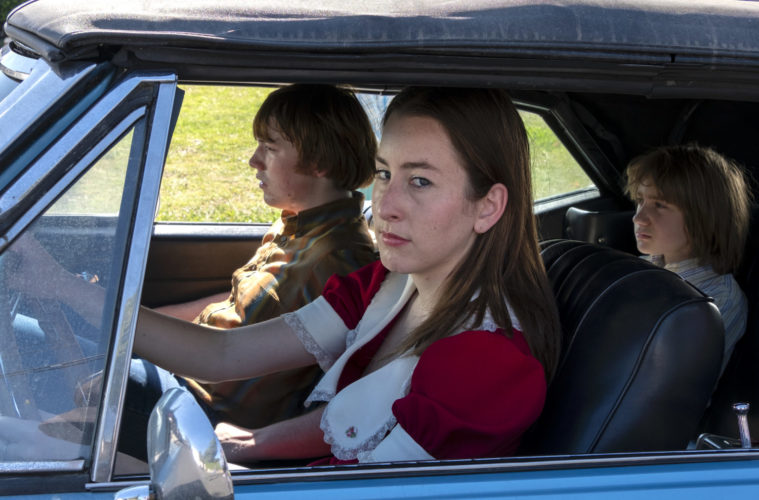This week’s L.A. Weekly cover story featuring a conversation with P.T. Anderson about Licorice Pizza, the 70s and the enduring allure of the San Fernando Valley, appears in edited and condensed form in our print edition (“A New Slice of Nostalgia”). This version contains the full Q&A as well as more thoughts on the director’s work, the film, its subject matter and more.
By definition, nostalgia is about wistfulness, warmth, and fond feelings for the past. But evoking it needn’t always be driven by reliving simpler times. From the awkward innocence of childhood to the hormonal discovery of teenhood to the promise and scary freedom of finally becoming a grown-up, nostalgic cinema aims to reflect the personal and relatable complexities of life within a particular time period.
The best movies do it visually and viscerally. Sets, costumes and props can recreate an era (and depending on the wardrobe department, some do it better than others) but it’s the story and the director’s approach to telling it that make or break it. Paul Thomas Anderson has become known for making it more than once, conjuring the past in a dynamic and immersive way. In particular his mastery of atmosphere no matter the era, from the smoky casinos of his debut Hard Eight, to the coked-out pool parties in Boogie Nights to the rainy car rides of SoCal in Magnolia, stands out and puts him on the shortlist beside contemporaries (Quentin Tarantino, Cameron Crowe) as well as his own influencers (Robert Altman, Jonathan Demme) in terms of transportive filmmakers.
With Licorice Pizza the award-winning writer/director returns to his beloved San Fernando Valley, Reseda in 1973 to be exact, to chronicle the misadventures of Gary Valentine (Cooper Hoffman, son of Philip Seymour Hoffman), a 15-year-old former actor trying to find his way after gigs start to dwindle. Based on the experiences of Anderson’s pal Gary Goetzman (and Tom Hanks’ production partner), Valentine’s entrepreneurial spirit manifests into a waterbed business and later a pinball parlour, but it’s his infatuation with Alana (Alana Haim, of the rock group Haim) that’s at the aspirational heart of the movie. She’s 10 years his senior so a romance is not in the cards but she’s drawn to him nonetheless. The film follows the pair’s friendship and individual struggles to find their callings.
Alana ends up getting involved with local politics in the last act, a not too surprising development coming after the film’s audacious highpoint, when the gas shortage of ’73 ends up putting both lead characters in peril. After an encounter with a spastic Hollywood producer (Bradley Cooper) leads to a wildly dangerous in-reverse ride in a U-haul, you really wonder what’s coming next. It’s a nail-biter in an otherwise slow-burning slice of life movie.
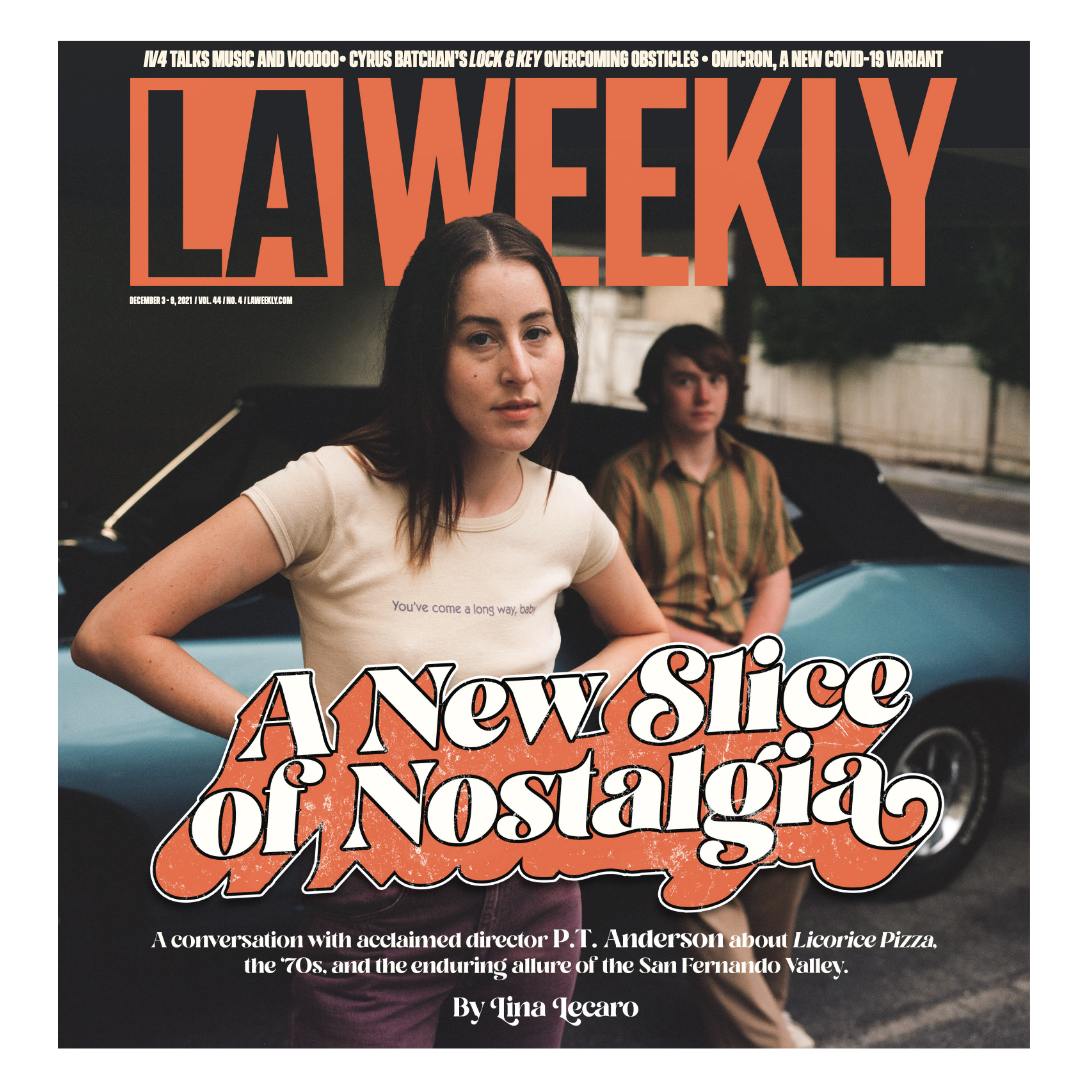
(This week’s LA Weekly cover story).
By the way, Pizza is no Boogie Nights and those expecting it to be may be disappointed. It’s set a bit earlier, and it’s a much more innocent film in general. Nevertheless it has a similar subtext– about families, friends, and finding one’s purpose in life, all while growing up in proximity to the entertainment industry. Before Valley Girl (the film) highlighted the contrast between Hollywood’s mystique and the suburban sensibilities “over the hill,” those of us who grew up in Los Angeles in the 70’s lived it, and many were inspired by it. Ultimately the setting is as important as the story, and Licorice Pizza captures it so beautifully, it’s worth seeing for this reason alone, especially for L.A. natives (even if those who remember the record store it’s named after will miss actually seeing it in the film).
In recent years Anderson has worked with universally acknowledged acting greats like Daniel Day Lewis (There Will be Blood, The Phantom Thread) and Joaquin Phoenix (Inherent Vice, The Master) but his casting choices have mostly varied, from familiar powerhouses (Philip Baker Hall, John C. Reilly, Julianne Moore) to unexpected career-changing choices (Mark Wahlberg, Adam Sandler, Burt Reynolds).
With his latest, he takes the biggest risk of all, casting leads who had never acted in a feature length film before. He worked with Haim on music videos and shorts previously, and Cooper, a family friend via his dad (who died in 2014), is a novice save for P.T.’s “home movies.” Both pull off what’s needed here, bringing touching realism as well as a Sonny & Cher-like chemistry to the screen. Sean Penn, Tom Waits, local dance legend Ryan Heffington and Haim’s real-life family add delectable texture to this simple tale of self-discovery.
It’s not always easy to pull off a vintage-vibed movie. The lines between authentic recreation, sizzling (or fizzling) satire and cheesy farce are thin and maintaining tone can be tricky especially if flamboyant characters are involved. Beyond the polyester frocks and shaggy hairdo’s, the people and the places have to ring true, no matter how weak or strong the narrative might be or how seductive the situations seem on paper. After a tough year, Licorice Pizza’s bittersweet California-dreamy journey is a refreshing flashback for movie fans and it signals an auspicious new phase for Anderson. His latest may be (once again) set in the past, but its climax suggests a hopeful future. And as the writer, director, husband and father shared in our thoughtful and unfiltered conversation, he’s enjoying himself more than ever doing what he does, or at least he’s trying to.
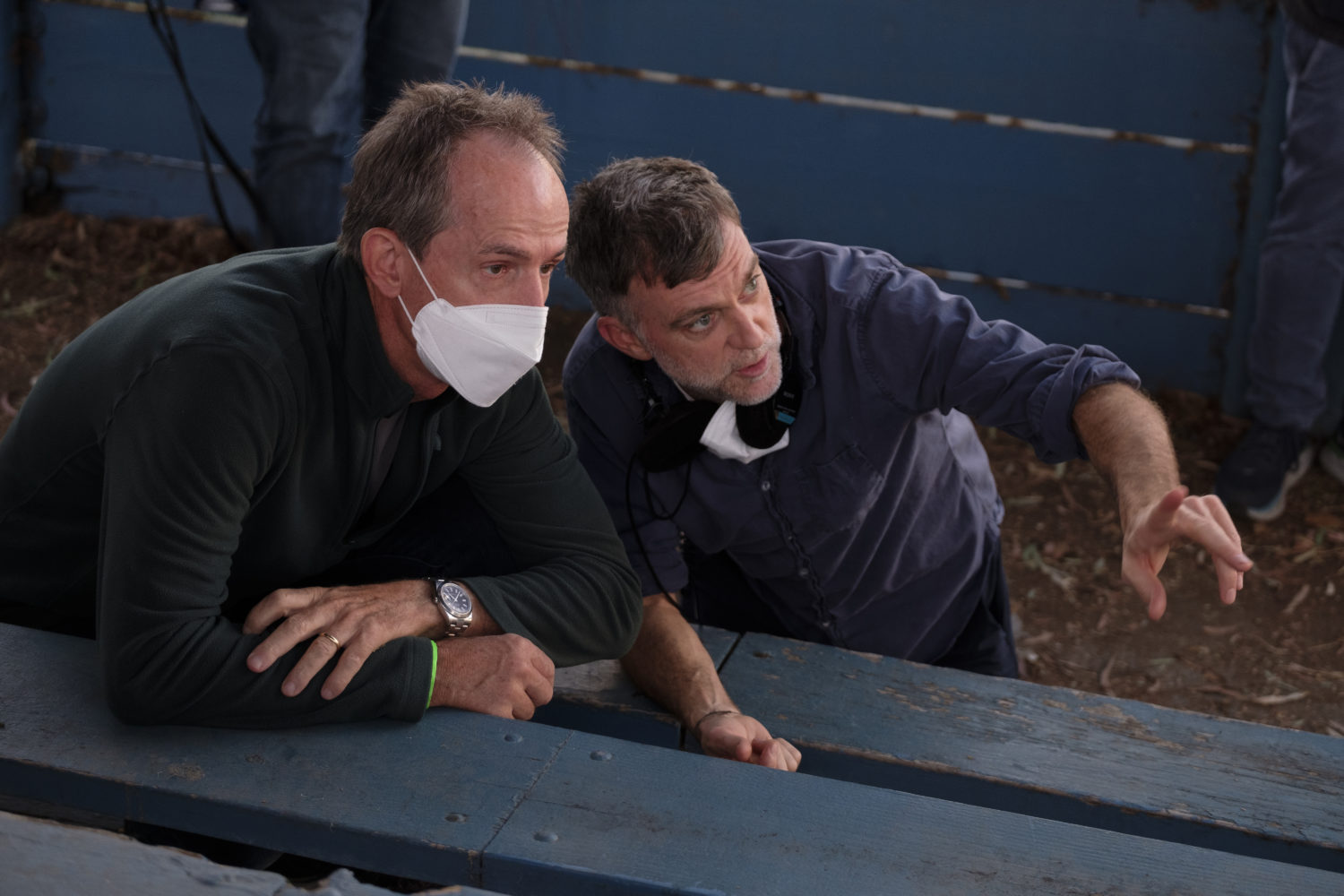
P.T. Anderson (right) at work on Licorice Pizza. (United Artists Releasing)
LA WEEKLY: To start off, I thought it might be enlightening to discuss reviews and the critical reception your films have received. Do you care about what the critics say and do you think about the reception at all before a film comes out?
P.T. ANDERSON: It’s one thing when a writer takes the time to use their skill to describe things they felt from the film– that really gets you going and it makes you feel something. I’ve gotten very good reviews generally over my career. There’s definitely been moments where films have been more challenging. But you appreciate the writers that you care about, or writers that clearly put their heart into it, being right there with you, even if admitting that they struggled with the film. Because there’s lots of reviews out there. I mean, fucking reviews, sometimes, they’re boiled down to how many stars or thumbs up or thumbs down, or like a quick capsule ‘hot or not’ kind of thing.
The world is so strange, because we used to really depend on reviews. If you make a film that’s slightly more challenging, you’re at the mercy of having good reviews because you don’t have the marketing budget to promote the film in a traditional blockbuster way. It’s a double edged sword; you’re dependent on and at the mercy of having good reviews to sort of create awareness.
You’re vulnerable when you put a film out. You’ve spent a lot of time making it, a lot of time dedicating yourself to this insane pursuit of a vision that you have to see through and you can put an armor up just in case somebody wants to kick you. And so when you find out that you don’t need that armor, it’s like dropping something to the ground, and it’s this huge like, ‘huh, okay, what was I so worried about?’
Have you felt that way with Licorice Pizza?
There’s so many people involved in the film that have never been involved in a film before. And so my concerns and my thoughts are about them. And you know, whatever jaded cynicism and protection I might put up around myself, I’m working with people that have none of that. And I want the best for them and I want to protect them. I don’t want anything harmful to come to them. You know, the reception for the film so far– I feel like I’m kind of lifting off the ground a tiny little bit. The other thing is I’ve had some successes before and I’ve just been too paranoid to enjoy it. I feel like it’s something that can distract you from your job or you have to keep your head down and stay humble and get back to work. I do think that’s important. But I also think at this point, it would be stupid not to lift your head up and enjoy the good will that comes towards you. It’s healthy. Fuck, if you can’t enjoy it, you need to see a doctor. It’s like. ‘enjoy it, come on, enjoy it.’ So I’m trying to do that.
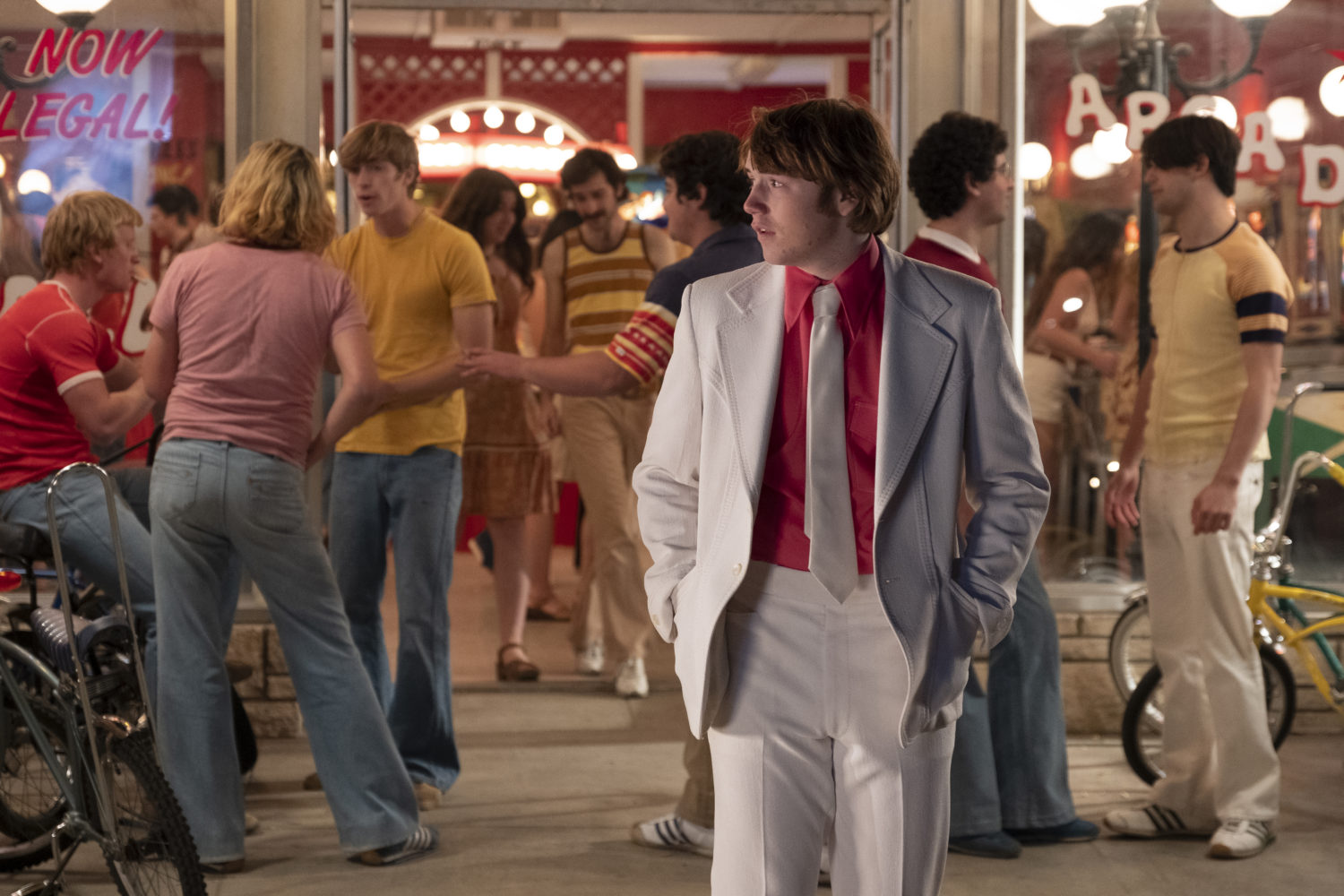
Cooper Hoffman in Licorice Pizza (United Artists Releasing)
That’s great. You should! Let’s talk about L.A. and specifically the Valley in the 70’s- a decade you capture so well. We’re both part of Generation X and L.A. natives, so we have a certain perspective on things. I think our generation is the most enamored with nostalgia. We don’t get enough credit for our influence on the present either. Do you have any thoughts on why that is and why so many of us are almost obsessed with recapturing the past?
You remember the generation before us talking about the 60’s and how great they were. I think we probably just sort of rolled our eyes. I mean, a bunch of dope smoking, peace signs and things we probably dismissed. You ask yourself, ‘Am I getting old? Am I delusional or was it better?’ I don’t think it’s that simple. I think it’s both. I think, obviously there’s no mystery anymore. And I think that’s a bad thing. That becomes apparent in the film– two friends trying to find each other, they only have their wits about them to run to the streets or to visit the restaurants that they shared together, the landmarks of their relationship… this kind of thing couldn’t happen in a film set today. By the way, we’ve had this acceleration of the past few years. If our innocence had been lost before, I mean, it’s way in the rear view mirror now after everything we’ve all been through. I’m too nervous and too hopeful about the future to be a fuddy duddy saying, ‘Yeah, we had it all and it was great back then,’… but it was great.
I agree. I’m a parent, as you are, and I think you have to stay positive about the future when you have kids. But there was something special about the era before computers and technology as it is today. We lived through that transitional period of the internet changing everything, which is pretty crazy if you really think about it.
I’m just remembering how the emergence of the internet felt so optimistic initially. It felt like this socialist platform everyone could contribute to and everything was going to be equal and wonderful in the same way that people thought about the 60’s as a revolution – how magnificent it was going to be and everything was going to change. And then it only took a few years before it was all completely fucking ruined.
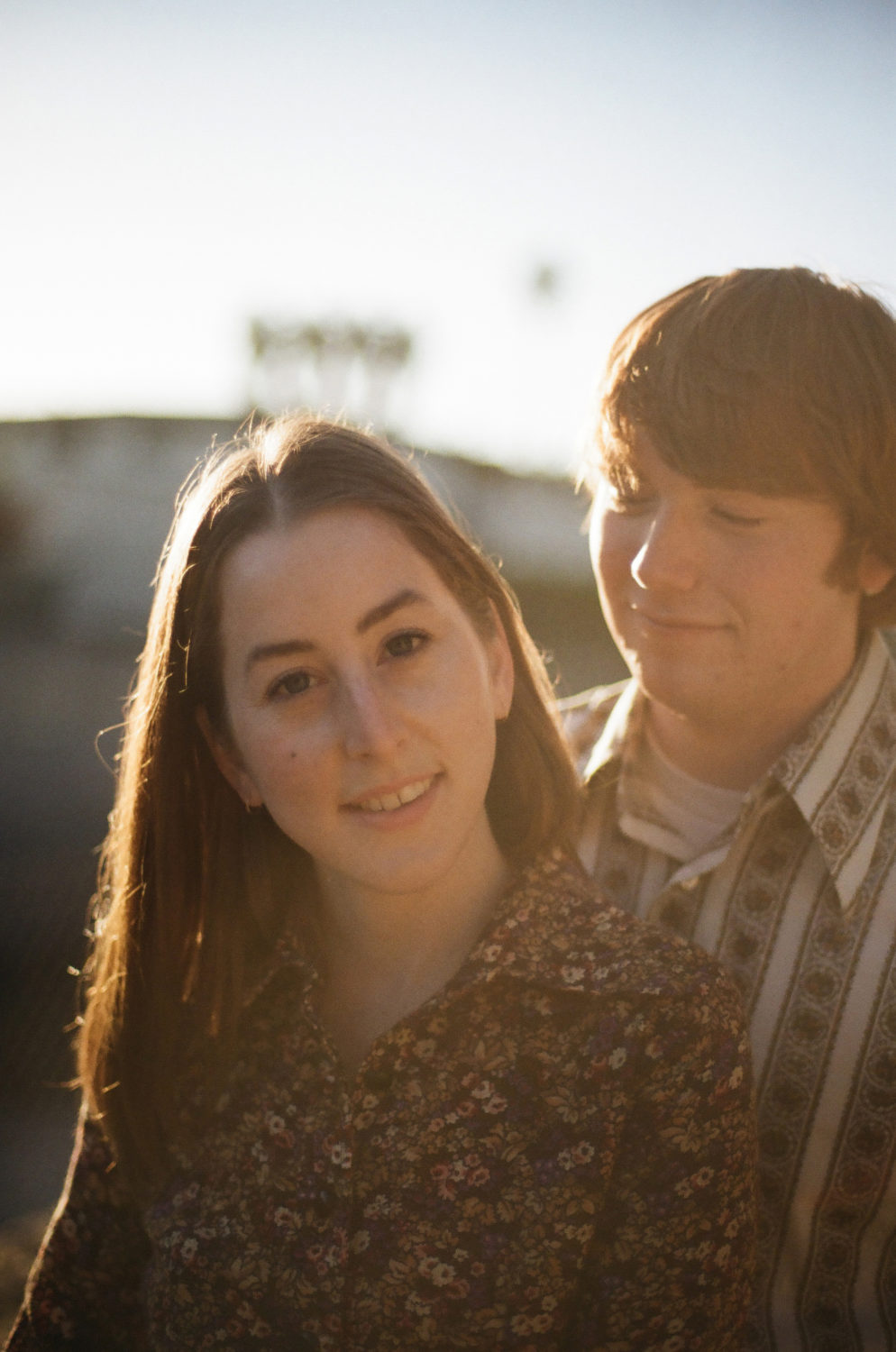
Alana Haim and Cooper Hoffman in Licorice Pizza (United Artists Releasing)
It’s true, but I think we stay optimistic and maybe try not to be like our own parents, bitterly boasting about the good ol’ days. And yet, your films are proof to a lot of us who grew in the ’70s that they were. From the clothing to the music to the simplicity of just hanging out with friends on a summer day. You really recreate it all so beautifully and I think that it’s alluring to watch even for someone who didn’t live through that time, especially backdropped by neighborhoods that look familiar no matter where you’re from. Can you explain a bit about the way you shoot and think about the look of your scenes?
The allure is probably a freedom that was afforded kids and adolescents that I don’t think is afforded them now. If you imagine this story in current day, Alana would be running down the street with a phone shoved in her back pocket, you know, in her short shorts. She’d probably have to hold the phone in her hand because her jeans are too tight. Now the phone is like a chain around young people and they know it, but they are powerless to do anything against it.
But, you know about the look, when we were filming this movie we started last August and shot through November. Many, many days, unfortunately, there were fires. And there was sort of a light red and it was constantly diffused with smoke. And I was remembering – we’d be standing there and it looked exactly like it looked in the early ’70s with all the smog. We look back and we reminisce about how wonderful that time was, but let’s not forget, there were days we weren’t allowed to go outside and play because there were smog warnings. The air quality was so bad, particularly in the Valley because it gets trapped between the Santa Monica Mountains and the San Gabriel Mountains.
In general the film has an authentic, almost documentary-like feel. These people seem real as do the situations. Can you comment on the things you did to achieve that?
Obviously, we kind of make a lot of noise about shooting on film. So that’s a very strong leg up in terms of authenticity. But here’s the thing I think that you’re touching on – you can use a camera from 1972, you can have filmstock from ‘72. Okay, you can do all that if you’re lucky enough to round all that up, and that can help, but it’s the people that you’re looking at more than anything in a movie, right? And no one has any makeup on.
Right. You actually see the acne on the characters, and the freckles. That’s how people actually look and looked. So that was very intentional then?
I think it’s probably the most important thing that we did in terms of achieving some version of authenticity. It would be impossible to justify wearing makeup for Alana’s character. She’s a 25 year old girl, she’s running around the San Fernando Valley in the summer of 1973. If she wears makeup it’s gonna melt. It’s just not realistic. So when you expose that and you expose what her skin really looks like, which is what everyone’s skin looks like, then you are instantly creating a more realistic situation. I think the benefit of that is that the audience relates to this character. They can see themselves. They see somebody that is not fake and isn’t like a movie star pretending to be somebody that they’re not. And what’s interesting is, the situations where Alana is supposed to wear makeup, like when she’s going to a job interview, she did her own makeup and she didn’t do it that well, and that’s perfect. That makes her vulnerable.
It does. It’s pretty striking.
We generally don’t have a large budget and I think early on, like with There Will Be Blood, I soon figured out if you can get the costumes right, it adds a lot. Because with There Will Be Blood we were outside for most of it, and in the desert, so we didn’t have big elaborate sets to try and sell you on the period. All we had was the actors and their costumes. I realized you absolutely have to get the costumes right because that’s what’s draping on the actor and that’s the main portal into the past.
With this one, there was always something that I was basing on my real life. Somebody that I knew, or somebody I knew once removed. My older sister had this friend and she used to always wear this t-shirt that said “I’ll try anything once.” So I was like, let’s get one of those.
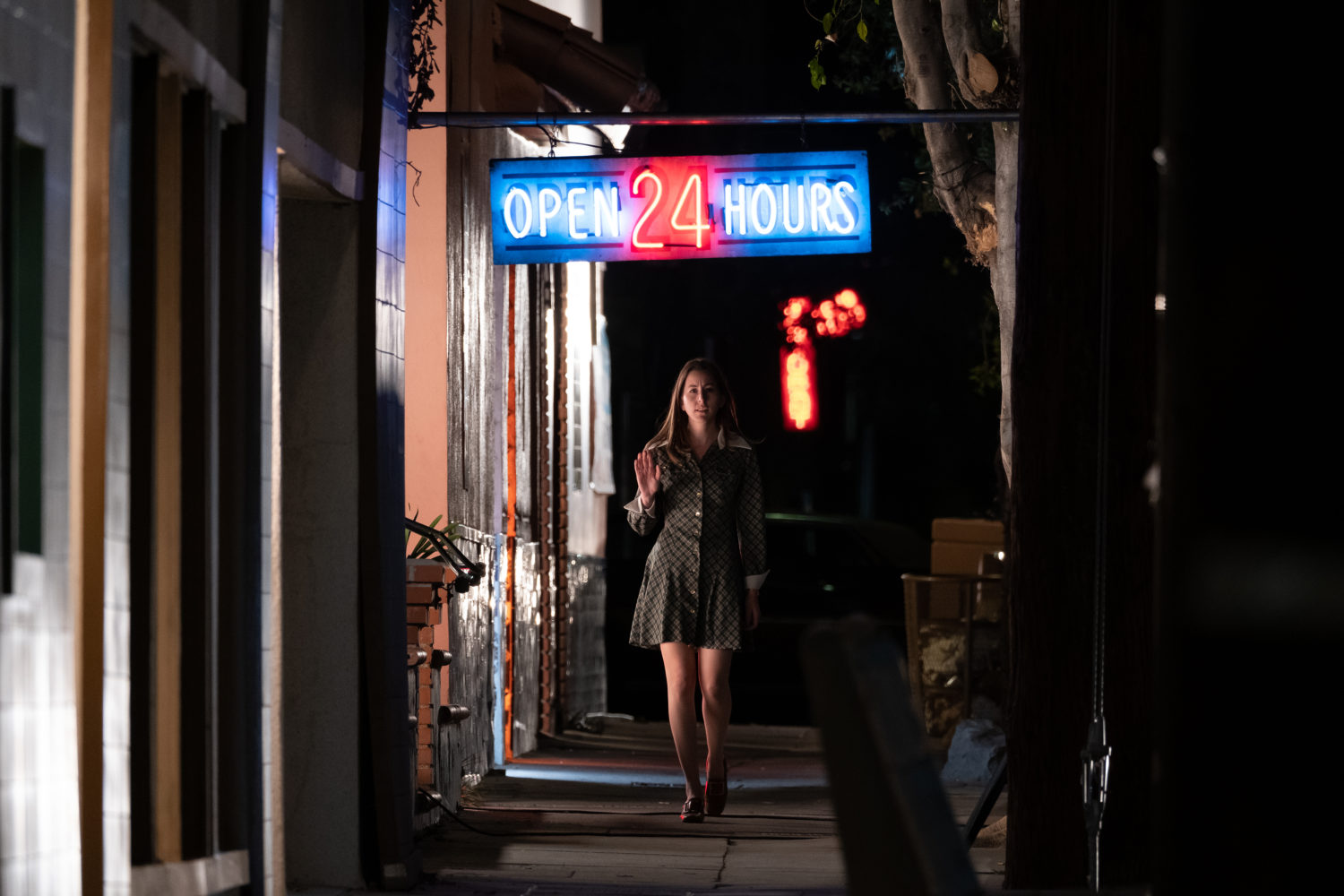
Alana Haim in Licorice Pizza (United Artists Releasing)
The classic 70’s statement t-shirt… Like her “You’ve Come A Long Way Baby” tee (seen in the promo posters), which was the Virginia Slims cigarettes slogan. I love that. As a vintage clothing collector, I must say the research and references are spot-on. The stylist did such a great job, especially with Alana’s outfits.
Mark Bridges was a costume designer on every film with me and he can do everything, from the clothes in Phantom Thread and There Will Be Blood to 70’s t-shirts, equally as well.
Seeing the film in Westwood [where it’s screening exclusively until worldwide release] I was reminded of Once Upon A Time in Hollywood, when Margot Robbie’s Sharon Tate goes there to watch herself. That was another epic movie that got it right with costuming and recreating historic L.A. locales. What did you think of it?
I saw it many times- Quentin is a friend of mine, and I absolutely love that film. I loved it so much that there was a moment when I thought, ‘do I really want to make a film that takes place at the same time.’ Well that’s set in the 60’s, but it may as well been the 70’s. I’d been there before with Boogie Nights and Inherent Vice. You don’t want to repeat yourself and you don’t want to be anywhere near a piece of work that you feel got it right. But you shake those feelings off because you have to follow your own rhythm. Quentin got so much right in that film, particularly in Brad Pitt’s performance. I think that’s going to be something that people talk about forever, what he did in that film.
Well Alana’s performance is similarly impressive, especially for a novice actress. She really embodies the period. The whole ensemble makes for such a varied cast of characters. It was a pleasant surprise to see Tom Waits and even choreographer Ryan Heffington on screen. Of course, you have big stars like Sean Penn and Bradley Cooper. Can you tell us a little bit about your thought process in assembling this cast?
Sean Penn I’ve been trying to work with over the years and I wrote something that I thought would be delicious for him to play. I always fantasized about giving him a nice haircut, putting a suit on him so that he could really inhabit that kind of character that I grew up loving, the William Holden older actor type.
Ryan Heffington was doing a lot of these dance tutorials during the beginning of the pandemic and Maya, my wife, was watching them. I would see them and I thought, ‘oh, I wonder if he would ever come play the part of this sort of dancing man servant to a Hollywood producer.’ If you’ve ever seen the movie S.O.B., a great Blake Edwards film from 1978, Stuart Margolin plays a very similar part. And I modeled the character after that. I was so excited to have him come and do it. That was our first couple days of shooting and he was terrific to work with.
Sean suggested Tom and I was so angry that I hadn’t thought of it first. I was salivating at the prospect he would do it and we asked him and he said yes. That’ll go down as one of my great memories of ever shooting anything – the weeks with Sean Penn and Tom Waits and Alana and Cooper at the Tail O’ the Cock restaurant.
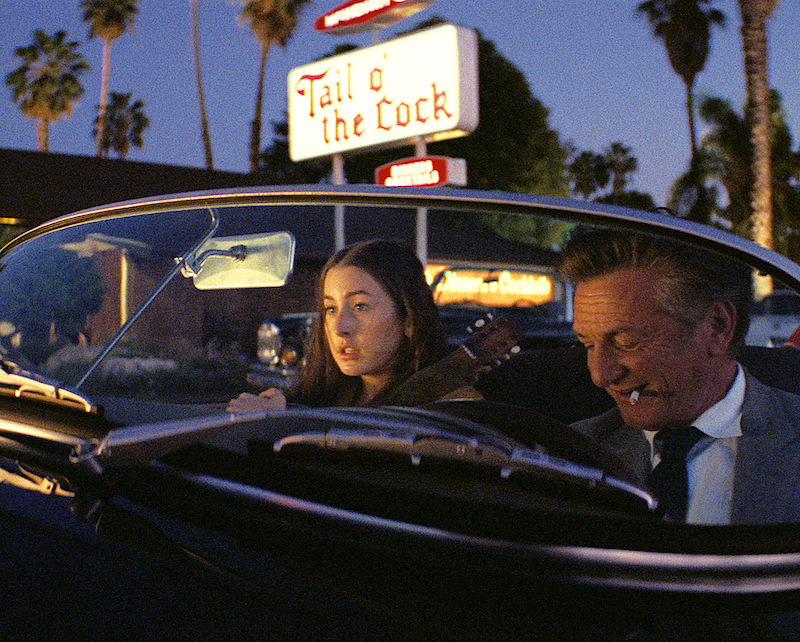
Alana Haim and Sean Penn in Licorice Pizza. (United Artists Releasing)
The Bradley Cooper as Jon Peters scenes are so good, too. Definitely the funniest part of the film.
He’s an incredibly dynamic actor. He’s got incredible range. He can do it all and I’ve been wanting to find an excuse to work with him for quite some time. This seemed like a perfect opportunity to let him grow his hair, grow his beard and away we go. That’s one component of it that I think is pretty clear. But I think what added to it, and what made it really achieve a different kind of lift-off is that it was the first thing we shot, and we only had five days with him. And so he got to set the table for these two young actors who’ve never done anything before. And I can remember we consorted, we schemed, and I told him, ‘you’re going to give these two an entrance into movie acting.’ He got to come out and chew the scenery and completely intimidate them. Which was right for the scene.
Cooper Hoffman is very endearing as Gary. You obviously knew him as he’s Philip Seymour’s son. When you offered him the role, was he into it right away or were there concerns because it was such a big part?
He was very hesitant and wanting to know more details. This is a very, very good indication of a strong, intelligent young man. It would not be a good sign if he had just suddenly said, ‘Yeah, sure. What are we doing?’ His response made me feel really good. But it didn’t take long after we read it with Alana, and did some practicing and improvising, that he was hooked.
Was he pursuing or studying acting at all before this role?
He never said I want to be an actor. He showed an aptitude for it in home movies that we would make so I asked him if he thought it would be something he’d be interested in talking about or trying. And he reluctantly said yes.
Wow, that’s incredible. Do you think he’ll continue to act? I think about Mark Wahlberg and how you put him front and center in Boogie Nights. People mostly knew him as Marky Mark and he became a big movie star afterward. Do you see these two going on to become big movie stars?
I would never say ‘my crystal ball says’… but what I will say is that their natural talent is enormous. In Alana’s case, she has a day job at the moment. So what’s wonderful about that is that she doesn’t need it. Cooper is still young and wants to pursue his studies. It’s there for him if he wants it, and it’s not going anywhere if he wants it, but there’s no rush.
And talking about Mark – there’s so many good actors, and there’s not that much great material. Actors get a role and then they’re asked to play that same role the rest of their lives. This is a very common thing. And it’s a drag because most actors have a lot more to offer than just one thing. So sometimes you’re casting a person, not on what they’ve done, certainly not on their experience or on the roles that they played previously, but based on who they are as people when you meet them.
Many times you can tell a lot more in an audition from a conversation that you’re having with somebody rather than how they actually read the scene. At this point, I’m interested in working with people that I know personally or that I’m able to get to know personally. I can’t imagine working with somebody who just comes in, and I don’t have a social relationship with outside of work. You can forge that if you like their work and you want to get to know them. But the work is too intimate to just be shared with somebody that you only know on the set.
So with Mark, you didn’t have a relationship before casting him in Boogie Nights ?
I didn’t. I formed that relationship in a much more traditional way. We met and talked about the part. We read the scenes a bunch, we hung out, we spent time talking together. That was much more accelerated than I would do it now. We spent a couple of weeks together, getting to know each other. And then it was clear that it would be a good working relationship. Now I have a different approach.
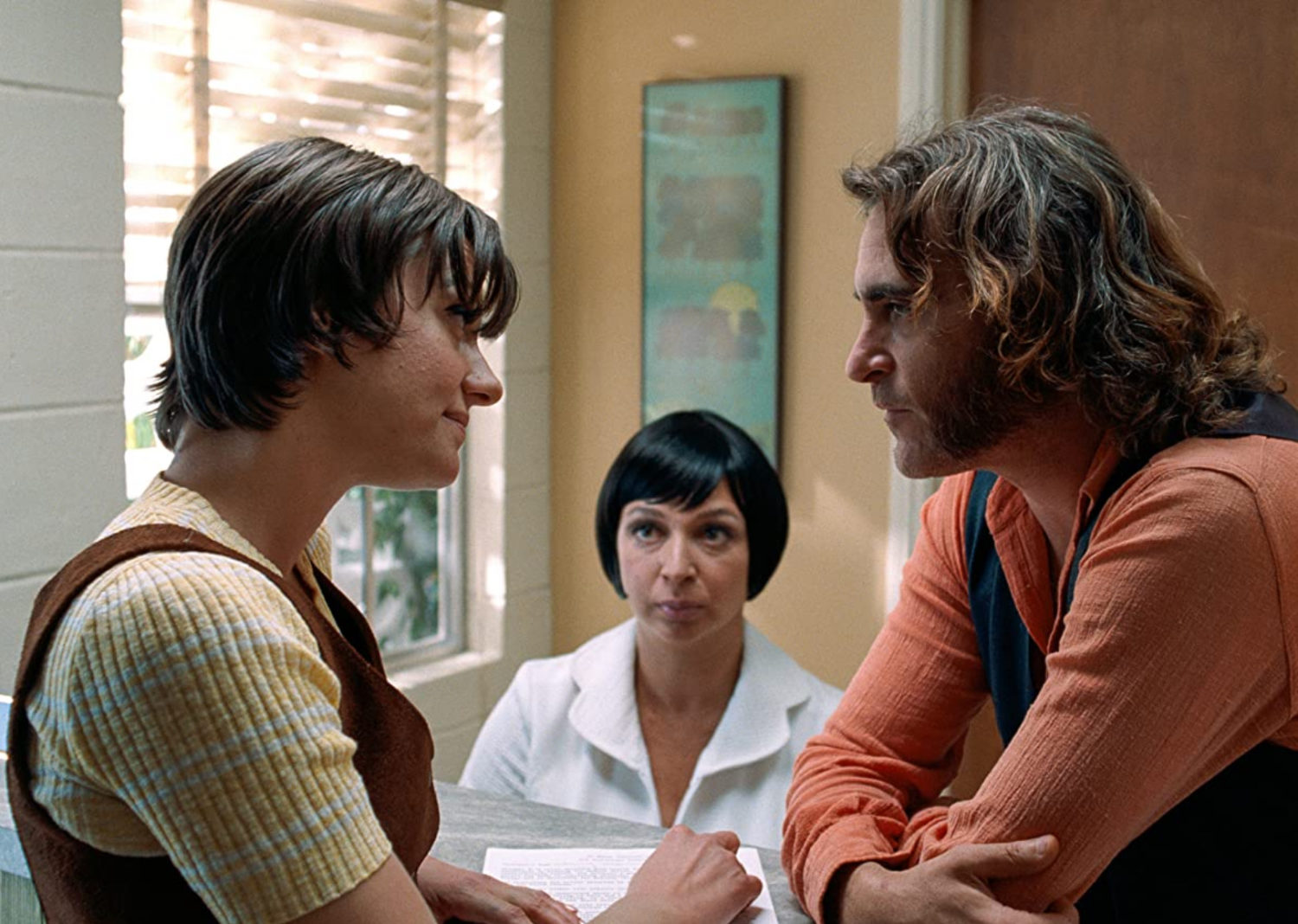
Inherent Vice (Warner Bros.)
At this point in your career, you have the luxury to choose people that you feel comfortable with and you know. You obviously like working with certain actors repeatedly. After watching a bunch of your movies together recently, including Inherent Vice, I noticed that your partner Maya Rudolph has a cameo in that and she has a cameo in Licorice Pizza as well. Do you guys consult each other on your creative endeavors and projects?
Probably far less consulting than you’d think, but only because we have four children. The majority of dialogue that happens in this house revolves around four children and the inner workings of this family. So at a certain point, dialogue about each other’s work is kind of an afterthought.
You can’t abuse the time that you have with somebody. I don’t want to share a script that I’m writing with Maya if I’m halfway done, you know, I want to share when I’m done so that I can get a well rounded opinion about it. We don’t have the time to get involved in all the nooks and crannies of what each other’s doing. But when it comes to the big mile markers, that’s when you’re really checking in with each other. So much of our life is taken up with the day to day, you know, we’re like doing our own production here. Our production, and the greatest work, is not even the work that you’re seeing– it’s the work with this family.
Well she is great and it’s really nice to see her in your films.
I know. There’s a particular moment that I like very much in Inherent Vice. When she has a scene with Joaquin Phoenix and something is mentioned about his ‘ex old lady Shasta Fay’ and right as the scene ends Minnie Riperton’s song Le Fluer comes on. Minnie was her mother. There’s a good 15-20 seconds where you get to see Maya on the screen with her mom singing. It’s one of those magical moments. I kind of remember doing that in the editing room late at night and coming home to tell her about it.
Music is so important to your films. Every song choice in Boogie Nights is perfect and of course, Magnolia (also set in L.A.) has music from local musicians Aimee Mann and John Brion setting the tone. Everyone from Suzi Quatro to Wings to David Bowie are highlighted in Licorice Pizza. Can you talk soundtrack choices?
The basic rule of thumb is you use music from that year or around that time. You have to balance things out with a song that will fit the story; a song that the characters would be listening to or that would emerge from a radio. But you have to be OK with cheating from time to time. Meaning our story takes place in 72-73. But the Suzi Quatro song is ‘75. You have to be open if the song helps your story. I think that one, which is heard about 8 minutes in, tells the audience this is what the film’s about. ‘Our love is alive’ and we’re ‘stumbling’ into this thing and we’re wandering into either a brick wall or a yellow brick road and we have no idea which….
You can’t depend on music to tell your story. If you don’t have the foundation of a strong script or the actors aren’t delivering, music is not going to save you. You can’t make the mistake of using a song in lieu of respect for your characters. There was an Onion headline I read the other day that I thought was hilarious– ‘Young screenwriter realizes he can play “Cherry Bomb” as a substitute for female character development.’ Exactly. Rather than really care about this character, let’s just play that; that’ll mean she’s a tough, badass girl. That kind of shit ends up feeling empty.
Speaking of music, Licorice Pizza is a record store chain that older Southern Californians remember fondly, but there are no references to it in the film. Did you have trepidation about using it as the title?
I mentioned it to a friend when I decided on the title, and he said, ‘yeah as long as you don’t mind answering the fucking question over and over.’ At a certain point, you realize that about .0001% of us know what it is. So there’s a regional component that might be upset. But then I thought, ‘well what does it do for me?’ It reminds me of my childhood which is kind of good enough. You reverse engineer some justification, meaning, well, she’s kind of like licorice and he’s kinda like pizza and they do not go together, but somehow it just kind of works. At a certain point, I felt like I had to go with something instinctual that felt right. Anything else seemed overly simplistic. I thought, ‘Does this feel like the film?’ Yes? OK, then do it. I don’t regret it. I’ve seen it pop up in the theater with an audience and I’ve felt a sense of relief, like, ‘I think we got that right.’
There’s a great scene where Peters (Cooper) is freaking out backdropped by a billboard of now-defunct L.A. FM radio station KMET. Those were everywhere in the 70’s and that along with other landmarks and settings (the Teen Fair at the Hollywood Palladium, Tail O’ the Cock, Cupid’s Hot Dogs) felt like indirect references to what the record shop meant to Southern Californians back then.
You know, you’d be surprised at how our collective subconscious works. We’re all connected and even if all we’re talking about is record stores and radio stations from the 1970s, I dare say that when this film shows in the center of London for people 20 years old, they’ll feel something authentic and that will in turn relate to their enjoyment of the film, even if they can’t quite put their finger on it.
P.T. Anderson’s Licorice Pizza is showing in 70 mm exclusively at the Regency Village Theater Westwood, 961 Broxton Ave. regencymovies.com. There is a “Fat Bernie’s Pinball Palace” recreation pop-up nearby (more info here). The film opens nationwide on Dec. 25.
xxx
Editor’s note: The disclaimer below refers to advertising posts and does not apply to this or any other editorial stories. LA Weekly editorial does not and will not sell content.
Advertising disclosure: We may receive compensation for some of the links in our stories. Thank you for supporting LA Weekly and our advertisers.

